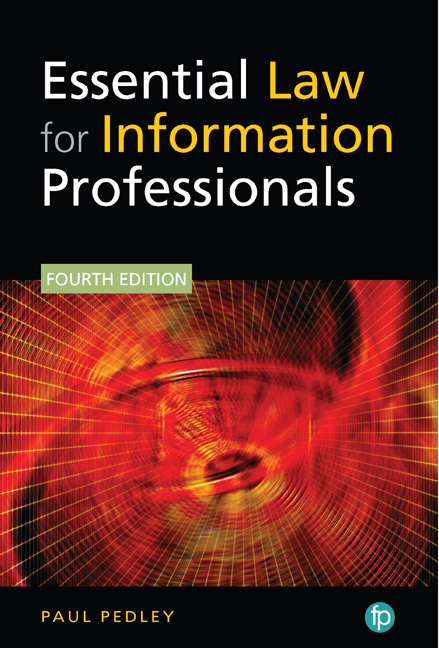Book contents
- Frontmatter
- Dedication
- Contents
- Disclaimer
- List of Figures and Tables
- Table of Statutes, Etc.
- Table of Cases
- Abbreviations
- Glossary of Terms
- Preface
- Chapter 1 General law and background
- Chapter 2 Library Law
- Chapter 3 Copyright
- Chapter 4 Legal Deposit
- Chapter 5 Breach of Confidence
- Chapter 6 Contracts and Licensing Agreements
- Chapter 7 Data Protection
- Chapter 8 Privacy
- Chapter 9 Freedom of Information
- Chapter 10 Human Rights
- Chapter 11 Re-use of Public Sector Information
- Chapter 12 Defamation
- Chapter 13 Professional Liability
- Chapter 14 Cybersecurity and Cybercrime
- Chapter 15 Disability Discrimination
- Chapter 16 Other Legal Issues Relevant to Librarians
- References
- Appendix 1 Brexit and the Orphan Works Exception
- Appendix 2 CILIP'S Ethical Framework
- Index
- Frontmatter
- Dedication
- Contents
- Disclaimer
- List of Figures and Tables
- Table of Statutes, Etc.
- Table of Cases
- Abbreviations
- Glossary of Terms
- Preface
- Chapter 1 General law and background
- Chapter 2 Library Law
- Chapter 3 Copyright
- Chapter 4 Legal Deposit
- Chapter 5 Breach of Confidence
- Chapter 6 Contracts and Licensing Agreements
- Chapter 7 Data Protection
- Chapter 8 Privacy
- Chapter 9 Freedom of Information
- Chapter 10 Human Rights
- Chapter 11 Re-use of Public Sector Information
- Chapter 12 Defamation
- Chapter 13 Professional Liability
- Chapter 14 Cybersecurity and Cybercrime
- Chapter 15 Disability Discrimination
- Chapter 16 Other Legal Issues Relevant to Librarians
- References
- Appendix 1 Brexit and the Orphan Works Exception
- Appendix 2 CILIP'S Ethical Framework
- Index
Summary
Introduction
Defamation law attempts to strike a balance between society's interest in freedom of speech and the individual's interest in maintaining their reputation. It is relevant to information professionals, whether they be responsible for intranets, publicly available websites or online databases; users of their organisation's internet e-mail system; members of internet e-mail discussion groups; or authors of books or articles in their own right.
The Defamation Act 2013 removed the previous presumption in favour of a trial by jury. Section 11 of the DA 2013 works on the basis that the trial should be without a jury unless the court orders otherwise.
General principles
English law distinguishes between libel (written) and slander (spoken). A statement is defamatory if it tends to:
1 Expose the person to hatred, ridicule or contempt.
2 Cause the person to be shunned or avoided.
3 Lower the person in the estimation of right-thinking members of society generally.
4 Disparage the person in his or her business, trade, office or profession.
In Scottish law, libel and slander are virtually indistinguishable with regard to both the nature of the wrongs and their consequences. The terminology of Scottish defamation law differs from that of English law. Where individual English litigants enjoy absolute privilege for what they say in court, their Scottish counterparts have only qualified privilege. ‘Exemplary’, or ‘punitive’, damages are not awarded by the Scottish courts. According to D. M. Walker: ‘Absolute privilege protects all statements made in judicial proceedings, whatever the rank of the court or the position of the person sued, so long as it is not a gratuitous observation’ (Walker, 1988, 637–8). However, Walker confirms that in Scotland, a party only has qualified privilege in his pleadings. This also extends to tribunals if the procedures are similar in essence to a court.
The Defamation Act 2013 introduced a new requirement that in order to be defamatory, a statement must have caused or be likely to cause serious harm to the reputation of the claimant. Section 1(2) says that ‘for the purposes of this section, harm to the reputation of a body that trades for profit is not “serious harm” unless it has caused or is likely to cause the body serious financial loss’.
- Type
- Chapter
- Information
- Essential Law for Information Professionals , pp. 247 - 268Publisher: FacetPrint publication year: 2019



